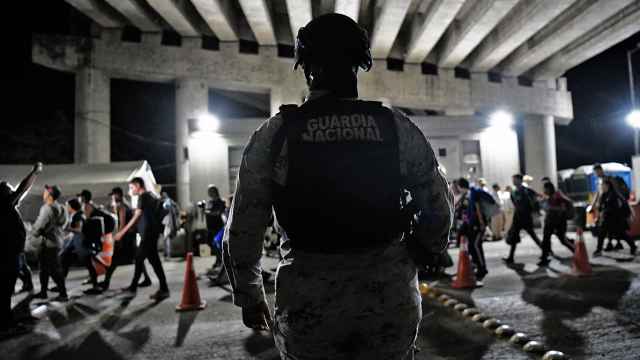Leonid Melekhin, a political activist from Perm, Russia, applied for asylum in the United States in August 2024. In December, his application was rejected due to a lack of “well-founded fear or clear probability of future persecution,” despite him having been detained multiple times in Russia for actions including holding a single-person picket to call for the release of Alexei Navalny from prison.
Melekhin’s activism was well documented in Russian media. In early 2025, he discovered that criminal charges had been filed against him in his home country. Despite this, he lost his appeal at the immigration court and was deported back to Russia, where he was promptly arrested for “justifying terrorism.”
Melekhin’s case is a clear example of the failure of the U.S. asylum system, which was designed precisely to prevent this kind of outcome. Nor is it an isolated incident: in January 2025, Yevgeny Mashinin was deported to Russia despite his history of arrests at opposition rallies and a European Court of Human Rights ruling that confirmed his unlawful persecution. Upon his return to Russia, Mashinin was immediately faced with new administrative charges and spent some time under arrest. However, he managed to escape before a criminal case was opened against him. He is currently in Morocco.
Unfortunately, there will be more cases like those of Melekhin and Mashinin. In the summer of 2025, the U.S. began mass deportations of Russian asylum seekers who had lost their court cases.
This year saw a crucial change in the logistics of deportation. There have been no direct flights between the U.S. and Russia since 2022. Before this summer, deportees were flown in small groups and it was sometimes possible to obtain documents from accompanying Immigration and Customs Enforcement (ICE) officials or local customs officers that would allow them to board a flight to a different country during their layover.
However, in recent months, ICE has established a single route through Egypt and begun coordinating deportations with the Egyptian (and likely Russian) authorities. Groups of 30 to 60 deportees are flown together — and it is impossible to escape to a third country from Cairo airport. Those who have tried to do so have been captured and beaten by Egyptian special services. Once the deportees arrive in Russia, they are systematically questioned by the FSB. Some are detained immediately.
U.S. immigration and asylum policy is notoriously dependent on the politicians in power. Yet the problems faced by Russian asylum seekers fleeing dictatorship and war began under Joe Biden’s presidency, not Donald Trump’s. Around May 2024, an internal directive prohibited ICE from releasing Russians while they waited for their asylum hearings. Conditions in ICE detention centers are often harsher than in prisons and the facilities are not designed to hold people for more than four to six weeks. Nevertheless, hundreds of Russians have already spent over a year in ICE detention.
Two new issues have emerged following Trump’s election. One is the declining asylum grant rate. Immigration judges have become more skeptical of testimony from Russians claiming political persecution, with tragic results in the cases of Melekhin and Mashinin.
The other issue stems from the new deportation logistics, which ensure that deported Russians are handed straight over to the deadly embrace of the FSB.
The world is rightly shocked by Trump’s cruelty towards migrants and asylum seekers. Russians are one of many nationalities to have fallen victim to it. However, the problems with U.S. immigration and asylum policy run deeper than Trump. Dozens of preventable deaths occurred in ICE detention centers long before Trump took office.
Furthermore, asylum hearings offer only a limited form of due process. U.S. immigration judges are, in fact, employees of the Justice Department and are highly dependent on the president-nominated attorney general. The Trump administration has actively used its power over immigration judges to launch a series of politically motivated dismissals — something that the executive branch would not have been able to do if immigration judges were part of the judiciary. In fact, both the American Bar Association and the American Immigration Lawyers Association have long campaigned for immigration judges to be removed from the U.S. Justice Department and for a truly independent immigration court to be created.
Additionally, unlike criminal hearings, asylum hearings do not require the U.S. government to provide legal representation for individuals who cannot afford it. This issue is exacerbated by the conditions in ICE detention, which make it extremely difficult to hire a lawyer and organize one’s defense. Leonid Melekhin had no legal representation in both his initial and trial hearings. As a result, he now sits in a Russian prison.
The situation of asylum seekers in the U.S. and elsewhere highlights a paradox first discussed by the philosopher Hannah Arendt: people without a national community (such as refugees seeking asylum in other countries) are deprived of even the most basic human rights, even though they are the group that needs them the most. They have lost their rights associated with citizenship, yet human rights in their pure form, disconnected from specific national communities, prove to be elusive for them.
Refugees are among the most vulnerable groups of people on Earth. However, this vulnerability is not inevitable. Their human rights can and should be asserted, even when they are under a brutal assault by nationalist dictators everywhere. The rights of Russian asylum seekers in the U.S. are being fought for by activists, politicians and journalists. One such group is Russian America for Democracy in Russia, a diaspora organization committed to helping Russian refugees.
Even when the fight seems hopeless, one must not give up. This is what Alexei Navalny taught us, and we will honor his legacy by protecting those who are now being persecuted in Russia for supporting his cause and left to their own devices in the United States, the supposed beacon of freedom for the world.
A Message from The Moscow Times:
Dear readers,
We are facing unprecedented challenges. Russia's Prosecutor General's Office has designated The Moscow Times as an "undesirable" organization, criminalizing our work and putting our staff at risk of prosecution. This follows our earlier unjust labeling as a "foreign agent."
These actions are direct attempts to silence independent journalism in Russia. The authorities claim our work "discredits the decisions of the Russian leadership." We see things differently: we strive to provide accurate, unbiased reporting on Russia.
We, the journalists of The Moscow Times, refuse to be silenced. But to continue our work, we need your help.
Your support, no matter how small, makes a world of difference. If you can, please support us monthly starting from just $2. It's quick to set up, and every contribution makes a significant impact.
By supporting The Moscow Times, you're defending open, independent journalism in the face of repression. Thank you for standing with us.
Remind me later.








